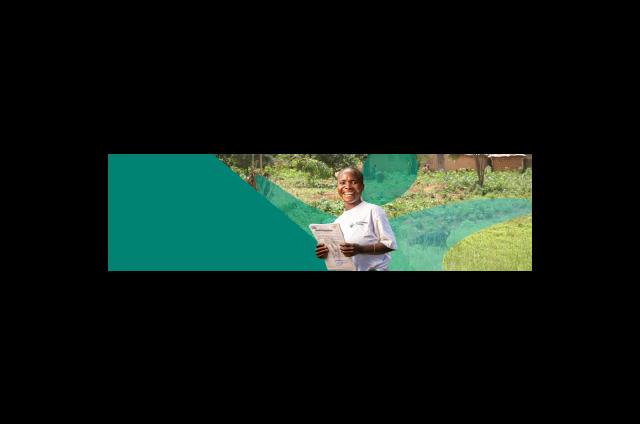DRC 2022 Chart page
Goal 1: No Poverty
End poverty in all its forms everywhere.
62% OF WOMEN PARTICIPANTS REPORT EARNING AT LEAST $1.90 A DAY
TARGET 1.1: BY 2030, ERADICATE EXTREME POVERTY FOR ALL PEOPLE EVERYWHERE, CURRENTLY MEASURED AS PEOPLE LIVING BELOW THE INTERNATIONAL POVERTY LINE ($1.90 A DAY)
62% of women graduates of our programme in the DRC reported personal earnings of at least $1.90 a day, compared to 2% at enrolment.
Goal 1: No Poverty
End poverty in all its forms everywhere.
98% OF WOMEN PARTICIPANTS REPORT SAVING A PORTION OF THEIR EARNINGS
TARGET 1.5: BY 2030, BUILD THE RESILIENCE OF THE POOR AND THOSE IN VULNERABLE SITUATIONS AND REDUCE THEIR EXPOSURE AND VULNERABILITY TO CLIMATE RELATED EXTREME EVENTS AND OTHER ECONOMIC, SOCIAL AND ENVIRONMENTAL SHOCKS AND DISASTERS.
98% of graduates of our programme in DRC reported saving a portion of their earnings compared to 23% at enrolment. This significant increase highlights the importance of a holistic approach to programming that incorporates financial saving as a pillar of building both social and economic power.
Goal 2: End hunger
No hunger, achieve food security and improved nutrition and promote sustainable agriculture
67% OF WOMEN GRADUATES REPORT HAVING SUFFICIENT FOOD IN THE HOUSE
TARGET 2.1: BY 2030, END HUNGER AND ENSURE ACCESS BY ALL PEOPLE, IN PARTICULAR THE POOR AND PEOPLE IN VULNERABLE SITUATIONS, TO SAFE, NUTRITIOUS AND SUFFICIENT FOOD ALL YEAR ROUND.
Upon graduating from our year-long programme, 67% of women reported having sufficient food in the house in the last four weeks compared to 17% at enrolment.
Goal 3: Good Health and Wellbeing
Ensure healthy lives and promote well-being for all, at all ages.
9% OF WOMEN PARTICIPANTS REPORT PRACTISING FAMILY PLANNING
TARGET 3.7: BY 2030, ENSURE ACCESS TO SEXUAL AND REPRODUCTIVE HEALTH-CARE SERVICES, INCLUDING FAMILY PLANNING, INFORMATION AND EDUCATION.
9% of graduates of our programme in DRC reported practicing family planning compared to 6% at enrolment.
Whilst this is a slight increase in the number of women practicing family planning, the percentage of women is still low at graduation.
Our interpretation of this data is that contraceptive use in DRC is generally very low (demonstrated by the 6% datapoint at baseline), so for the women we serve (the most marginalised in the community), a 9% endline is positive improvement.
Goal 4: Quality Education
Ensure inclusive and quality education for all and promote lifelong learning
84% OF SCHOOL-AGED GIRLS (5-17) YEARS IN SCHOOL
TARGET 4.1: BY 2030, ENSURE THAT ALL GIRLS AND BOYS COMPLETE FREE, EQUITABLE AND SECONDARY EDUCATION LEADING TO RELEVANT AND EFFECTIVE LEARNING OUTCOMES
84% of school aged girls related to women enrolled on our programme were in school at graduation in comparison to 74% at enrolment.
*This year we have changed our approach to collecting data on girls' education to provide us with a more accurate average. Therefore, this year's data on girls' education should not be directly compared with previous years.
Goal 5: Gender Equality
Achieve gender equality and empower all women and girls
153% INCREASE IN PERCEIVED SELF-EFFICACY OF WOMEN PARTICIPANTS
TARGET 5.1: BY 2030, END ALL FORMS OF DISCRIMINATION AGAINST ALL WOMEN AND GIRLS EVERYWHERE.
The perceived self-efficacy of the women on our programme in the DRC has increased on graduation, from 0.3 on average to 0.76 on a scale of 0-1.
Goal 5: Gender Equality
Achieve gender equality and empower all women and girls
14% OF WOMEN REPORT BEING INVOLVED IN DECISIONS ABOUT HAVING MORE CHILDREN
TARGET 5.6: BY 2030, ENSURE UNIVERSAL ACCESS TO SEXUAL AND REPRODUCTIVE HEALTH AND RIGHTS AS AGREED IN ACCORDANCE WITH INTERNATIONAL STANDARDS
14% of women graduates of our programme in the DRC reported being involved in decisions about having more children compared to 5% at enrolment.
As mentioned for Goal 3, our interpretation of this data is that very few women are involved in decisions about having more children in the DRC (demonstrated by the 5% datapoint at baseline), so for the women we serve (the most marginalised in the community), a 14% endline is positive improvement.
Goal 8: Good jobs and economic growth
Promote inclusive and sustainable economic growth, employment and decent work for all
91% OF WOMEN REPORT EMPLOYMENT
TARGET 8.5: BY 2030, ACHIEVE FULL AND PRODUCTIVE EMPLOYMENT AND DECENT WORK FOR ALL WOMEN AND MEN, INCLUDING FOR YOUNG PEOPLE AND PERSONS WITH DISABILITIES, AND EQUAL PAY FOR WORK OF EQUAL VALUE.
On graduation of our programme, 91% of women reported employment across all occupation levels, compared to 74% at enrolment.
Goal 16: Peace, Justice and Strong Institutions
Promote just, peaceful and inclusive societies
10% OF WOMEN HAVE SPOKEN PUBLICALY AGAINST ABUSE OF WOMEN
TARGET 16.1: BY 2030, SIGNIFICANTLY REDUCE ALL FORMS OF VIOLENCE AND RELATED DEATH RATES EVERYWHERE.
10% of graduates from our programme reported speaking out against abuse of women. While still low, it is still a positive increase from 3% at enrolment.
Goal 16: Peace, Justice and Strong Institutions
Promote just, peaceful and inclusive societies
75% OF WOMEN PARTICIPANTS REPORT DISCUSSING COMMUNITY ISSUES WITH EACH OTHER
TARGET 16.7: BY 2030, ENSURE RESPONSIVE, INCLUSIVE, PARTICIPATORY AND REPRESENTATIVE DECISION-MAKING AT ALL LEVELS.
The percentage of women who reported discussing community issues with other women had increased by the end of our year-long programme in the DRC, from 51% at enrolment to 75% at graduation.
“I am very happy to know that the law does not exclude people living with disabilities because they are victims of discrimination in their families, and I suggest talking about it with many other people so that everyone understands that people living with disabilities have the same rights as everyone else and they deserve special attention due to their status."
Stronger Women, Stronger Nations programme participant DRC.


